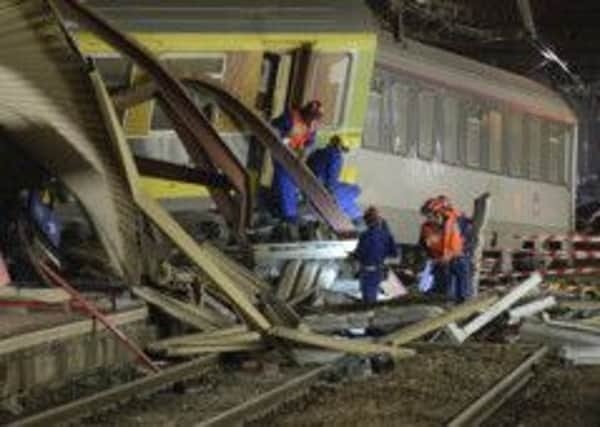Paris train crash: Points failure link


Nearly 200 people were injured and nine remained in critical condition last night.
The packed train, which left Paris on Friday evening with 385 passengers, jumped the track about 20 minutes into a scheduled three-hour journey as it travelled through Bretigny-sur-Orge station. It crashed into the platform and some carriages tipped over.
Advertisement
Hide AdAdvertisement
Hide AdHuman error has already been ruled out, according to transport minister Frederic Cuvillier, and attention has focused instead on the points system, which guides trains from one track to another.
Investigators found that a piece of metal in one joint in the points linking two rails had disconnected from its normal position, Pierre Izard, an official with the national rail company, SNCF, told reporters.
“It moved into the centre of the switch and in this position it prevented the normal passage of the train’s wheels and it may have caused the derailment,” he said.
Investigators were looking into how this happened since another train had travelled safely through the station about 30 minutes before the accident took place. In addition, investigators were attempting to find out why the train’s third carriage was the first to derail.
The train was travelling at 137kph (85mph), below the limit of 150kph (93mph).
Meanwhile, a massive crane was transferred from northern France to the accident scene to remove damaged carriages from the tracks. The layout of the site makes the operation awkward, with the arm of the crane having to manoeuvre over buildings to reach the wreckage.
“The SNCF considers itself responsible,” rail company’s president Guilaume Pepy said. “It is responsible for the lives of its clients.”
The train was about 12 miles into its 250-mile journey to Limoges in west-central France when tragedy struck.
Advertisement
Hide AdAdvertisement
Hide AdYesterday passengers and officials in train stations throughout France held a minute’s silence at noon to honour those who died in the accident.
Hundreds of thousands of people were expected to travel by train this weekend, to the coast, mountains or to see family.
Summer weekends are always busy on France’s extensive rail network, but this weekend is typically one of the busiest as the country celebrates Bastille Day, a national holiday, today.
While the death toll has not increased since the hours after the crash, Michel Fuzeau, who is the head of local regional government, said that until an overturned carriage is lifted, he could not rule out the possibility that there were more people trapped under it.
“This is only a hypothesis and we hope it’s not [the case],” he said.
“Everything was fine and then all of a sudden it was if we were riding through gravel,” Clement, 17, one of the train’s passengers, who was in the second coach, said. “Then the wagon in front of me started to tilt over.”
Hours after the crash president François Hollande, due to give the traditional Bastille Day address from the Elysée Palace today, travelled to the scene to commiserate with families of the victims.
By yesterday morning, Cuvillier, the transport minister, said 30 people remained in hospital, including nine in a critical condition. Most of the 200 or so people injured were either treated at the scene or were hospitalised briefly before being discharged.
Advertisement
Hide AdAdvertisement
Hide AdThe crash was France’s worst in years, but Cuvillier said it could have been even worse and praised the driver who sent out a network alert quickly, thus preventing a pile up.
Cuvillier acknowledged that there was some criticism that France had not invested enough in maintaining infrastructure.
“But for the moment we have no information that allows us to confirm that the rundown of the network was the cause of this derailment,” he told French television.
Keira Ichti, 56, who lives in the town where the train crashed, said she was terrified when she found out about the accident because her daughter works at the station. “[It was] total panic. My heart was beating so fast. I had no strength,” she said.
She later found her daughter outside the station.
France has suffered a number of train crashes in the past few decades. One of the deadliest was in 1988, when a commuter train entering Paris’s Gare de Lyon crashed into a stationary train, killing 56 people, after its brakes failed. In 2002 a fire swept through a Paris-Vienna overnight sleeper in eastern France, killing 12.